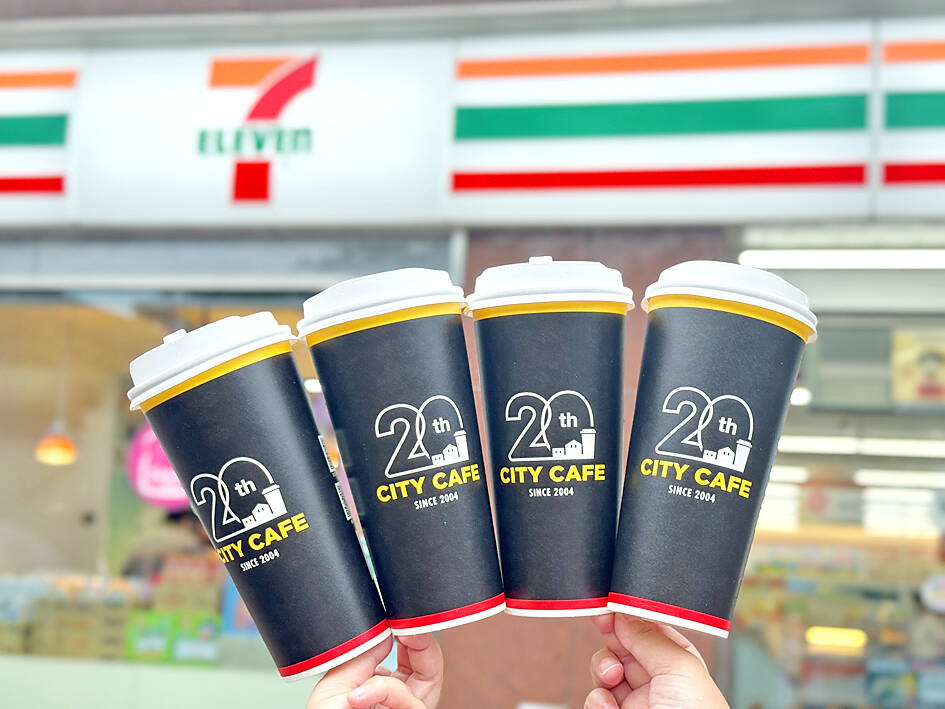Starbucks Corp might have the more recognizable name, but 7-Eleven’s City Cafe remains the king of Taiwan’s fresh coffee market, helped by the convenience store chain’s extensive market presence and product diversification.
President Chain Store Corp (PCSC, 統一超商), which runs both the 7-Eleven and Starbucks store chains in Taiwan, established the City Cafe brand in 2004.
The brand took off when actress Gwei Lun-mei (桂綸鎂) became its spokesperson in 2007.

Photo courtesy of President Chain Store Corp
City Cafe’s sales exceeded NT$10 billion (US$311.69 million) for the first time in 2015, surpassing the revenue of Starbucks Taiwan, and rose to more than NT$17 billion last year, exceeding the NT$14.98 billion in sales posted by Starbucks Taiwan.
Those figures, confirmed at PCSC’s investor conference last month, far outpaced the growing fresh coffee businesses of other convenience store chains operated by Taiwan FamilyMart Co (全家便利商店) and Hi-Life International Co (萊爾富).
Part of City Cafe’s success is the popularity and extensive network of the 7-Eleven chain, and with the number of 7-Eleven stores expected to reach 7,000 this year, analysts believe City Cafe sales could reach a new high of almost NT$20 billion this year.
Diversifying its coffee brands has also paid dividends, PCSC said.
With City Cafe celebrating its 20th anniversary this year, PCSC said that 7-Eleven has recently extended its brand offerings from affordable City Cafe to speciality coffee City Prima.
Having a range of products that makes its coffee appealing to more customers has helped City Cafe maintain its leading position in the freshly brewed coffee market, the company said.
Latte and Americano account for 40 percent of City Cafe sales, respectively, while other flavored coffee drinks account for the remaining 20 percent, it said.
Another convenience store chain, FamilyMart, launched its Let’s Cafe brand in 2006 and hired actor Mark Chao (趙又廷) to serve as its spokesman in 2009.
Let’s Cafe generated about NT$7 billion in revenue last year, with classic coffees and single-origin coffees accounting for 45 percent and 55 percent of its fresh coffee sales, respectively, the company said.
Hi Life is trying to carve out a larger share of the market, and spent up to NT$100 million in April to upgrade and refresh its Hi Cafe brand.
Hi Life’s Hi Cafe generated NT$2 billion in revenue last year. Sales up 50 percent year-over-year this year, on pace to push sales up to NT$3 billion for the year as a whole, the company said.

TARIFFS: The global ‘panic atmosphere remains strong,’ and foreign investors have continued to sell their holdings since the start of the year, the Ministry of Finance said The government yesterday authorized the activation of its NT$500 billion (US$15.15 billion) National Stabilization Fund (NSF) to prop up the local stock market after two days of sharp falls in reaction to US President Donald Trump’s new import tariffs. The Ministry of Finance said in a statement after the market close that the steering committee of the fund had been given the go-ahead to intervene in the market to bolster Taiwanese shares in a time of crisis. The fund has been authorized to use its assets “to carry out market stabilization tasks as appropriate to maintain the stability of Taiwan’s

STEEP DECLINE: Yesterday’s drop was the third-steepest in its history, the steepest being Monday’s drop in the wake of the tariff announcement on Wednesday last week Taiwanese stocks continued their heavy sell-off yesterday, as concerns over US tariffs and unwinding of leveraged bets weighed on the market. The benchmark TAIEX plunged 1,068.19 points, or 5.79 percent, to 17,391.76, notching the biggest drop among Asian peers as it hit a 15-month low. The decline came even after the government on late Tuesday authorized the NT$500 billion (US$15.2 billion) National Stabilization Fund (國安基金) to step in to buoy the market amid investors’ worries over tariffs imposed by US President Donald Trump. Yesterday’s decline was the third-steepest in its history, trailing only the declines of 2,065.87 points on Monday and

TARIFF CONCERNS: The chipmaker cited global uncertainty from US tariffs and a weakening economic outlook, but said its Singapore expansion remains on track Vanguard International Semiconductor Corp (世界先進), a foundry service provider specializing in producing power management and display driver chips, yesterday withdrew its full-year revenue projection of moderate growth for this year, as escalating US tariff tensions raised uncertainty and concern about a potential economic recession. The Hsinchu-based chipmaker in February said revenues this year would grow mildly from last year based on improving supply chain inventory levels and market demand. At the time, it also anticipated gradual quarter revenue growth. However, the US’ sweeping tariff policy has upended the industry’s supply chains and weakened economic prospects for the world economy, it said. “Now

An employment discrimination lawsuit against contract chipmaker Taiwan Semiconductor Manufacturing Co (TSMC, 台積電) might soon be expanded after a hearing in a federal court in San Jose, California, on Tuesday to add 15 plaintiffs to the case. According to a court document, the lawsuit, which was refiled in November last year as a form of a class action with 13 plaintiffs in California, wants to add 15 plaintiffs from Arizona, where TSMC is building up its wafer fab capacity. TSMC first committed between 2020 and last year to invest US$65 billion in three advanced wafer fabs in Arizona. It then pledged an